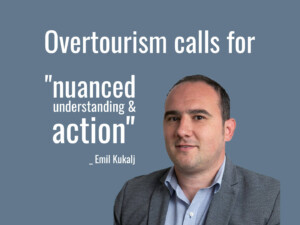Prof Greg Richards on academic silos, localism, overtourism, and modernity
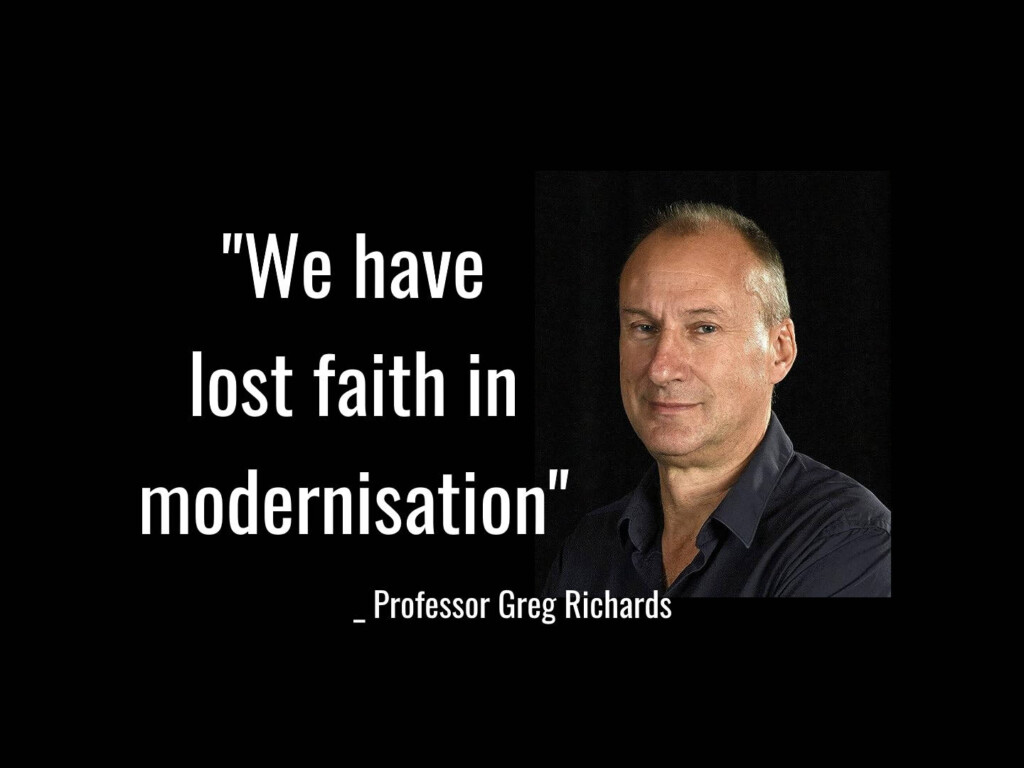
Greg Richards thinks more of us should lift our gaze from our narrow academic, business, and local concerns. We should scan the horizons of what we (think we) know, and try harder to understand the primordial instinct we have to travel and the human incentives that drive the tourism industry.
Professor Richards is the subject of the first in a series of Tourism’s Horizon Interviews. For this “Good Tourism” Insight, Jim Butcher summarises highlights of his in-depth interview with Prof Richards. [The full transcripts of the Tourism’s Horizon Interviews are available on Substack.]
Contents
- Who is Professor Greg Richards?
- Tourism in the universities
- Widening research horizons
- Localism = authentic?
- ‘Overtourism’ or ‘overtoeristisering’?
- Mass tourism and modernity
- ‘Chance encounters and serendipitous experiences’
- What do you think?
- About the author
- About the Tourism’s Horizon Interviews
- Featured image (top of post)
Who is Professor Greg Richards?
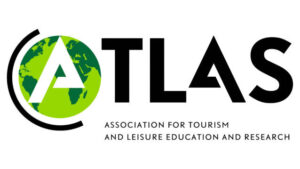
Greg Richards is one of the most well-known and respected analysts of contemporary tourism. His contribution to the field is estimable having pioneered research — both conceptual and applied — on a range of issues, with an emphasis on culture.
Prof Richards has worked on projects for numerous national governments, national tourism organisations, and municipalities. And he is also well-known through his long association with ATLAS (the Association for Tourism and Leisure Education and Research), an organisation he founded.
As Professor of Placemaking and Events at Breda University of Applied Sciences and Professor of Leisure Studies at Tilburg University, both in The Netherlands, Greg has extensive experience in tourism research and education. He previously held posts at London Metropolitan University (UK), Universitat Roviria I Virgili, Tarragona (Spain), and the University of the West of England (Bristol, UK).
Prof Richards’ main research areas are cultural and creative tourism, the relationship between cities and events, and youth tourism. Find his publications at ResearchGate.
Tourism in the universities
Richards has a lot to say about the academic scene around tourism.
He argues: “We are more connected to others than ever before via new technologies, and yet we seem to spurn these opportunities in favour of narrowing our vision to small corners of our own field.”
This rings true. There are few Renaissance Men or Women in the tourism field; people able and prepared to look across social, cultural, and economic trends, and offer deep perspectives on leisure travel.
For Richards: “Rather than reading books and broadening their minds, students are busy slavishly following the publication trails of those in their own field, cajoled by journal editors to quote work from the journal they want to publish in.”
This is a criticism that echoes in much of contemporary academia: “We have created nice shiny silos for ourselves, and more of us seem happy to continue working within them.”
The message is clear: There is a pressing need to put the understanding of the industry, and of tourism as a human activity, above the narrower instrumental considerations that have come to shape university life.
Don’t miss other “GT” content tagged “Education and training”
Widening research horizons
Richards practises what he preaches, encouraging students of the industry to look at broader trends behind the phenomena that impact tourism.
For example, Richards notes that whilst many look at the impact of AirBnB in cities, far fewer look at the ‘platformisation’ of parts of the economy that underlie it, or cross-reference it to the older issue of ‘gentrification’.
Reflecting on the trajectory of his own thinking, Richards tells us that his interest in backpacking research led him down a literary path. Authors such as Hemingway, Kerouac, and Theroux proved great fun, and also informative in understanding the expanding field of authenticity in tourism.
He recalls how in The Songlines, the travel writer Bruce Chatwin describes how the ‘Aboriginal Ancestors’ sung the landscape into being on their nomadic travels:
“They used songs to paint a picture of the world, and the relationship between nature and people. The constant movement of Aboriginal tribes was seen by Chatwin as the natural state for human existence.”
The yearning to travel is primordial, he concludes. It’s a useful reminder that motivations for travel can lie much deeper than can be captured in a formal list in a survey.
Localism = authentic?
Localism is closely associated with authenticity.
Richards tells us that “[a]rguably, ‘the local’ has become the new touchstone of authenticity. If something is ‘local’, then it must be authentic. This system is supported by Airbnb and many ‘live like a local’ tourism products across the globe.”
But the moral claims of localism’s advocates are not so straight forward: “In some ways […] the local turn is potentially more damaging than traditional mass tourism because it offers tourists a route into the cracks and crevices of the local.”
‘Local’ is a feel-good word conveying virtue. He is quite right to assert that we should not fall into the ‘local trap’ of assuming that everything local, including locally-based tourism, is inherently good.
‘Overtourism’ or ‘overtoeristisering’?
Since 2017 ‘overtourism’ has entered the vernacular of tourism scholars, so naturally we asked him about this.
For Richards, the ‘overtourism’ debate is often something of an oversimplification of a ‘multidimensional problem’. He prefers the Dutch ‘overtoeristisering’, developed by Myriam Jansen-Verbeke some years before the current version became fashionable. Put simply, this places the emphasis on the orientation of economy and society to tourism, rather than on tourism per se.
Tellingly, he points out that limited silo thinking, and reading, meant that Jansen-Verbeke’s analysis, which is published in Dutch, failed to catch the attention of citation-hungry scholars. Perhaps the interview will put that right.
And neither is ‘overtourism’ all about tourism: “[I]n many areas increasing property prices and local displacement preceded the arrival of tourists. Tourism has simply enhanced and intensified the process by bringing in more external capital.”
Don’t miss other “GT” content tagged “Carrying capacity, mass tourism, and overtourism”
Mass tourism and modernity
It is useful to think of discussions about tourism as reflections of wider debates about, and discontents with, modern society. As one publication put it, tourism is a metaphor of the social world.
Richards argues: “We have lost faith in modernisation, owing to what Ritzer termed the ‘irrationality of rationality’.” He cites the side effects of rational development — pollution, climate change, and social alienation — as reasons to be very cautious about continued growth. He points to his adopted home city of Amsterdam as an example where “it is possible to set limits, but it is very difficult to stick to them”.
Effective control over the development of real estate — whether you favour growth or not — is a key issue in popular tourist destinations. Richards is on the side of caution: “This growth rate is clearly unsustainable, even if improvements in technology and increased social responsibility manage to minimise the environmental impacts.”
Is such caution justified? If so, is it tenable in a capitalist system driven by growth? These are issues for growth sceptics and growth advocates alike.
‘Chance encounters and serendipitous experiences’
Those who know Greg — and so many will, through his long and close association with ATLAS — can vouch for the fact he is great company, known to share a story or two over a beer. It’s true that anecdotes are not the singular of data, but I make no apologies for finishing with this vignette from Greg’s interview:
“I spent many an evening wandering the back streets of tourist resorts while [friend] Keith followed his unerring bar detector:
“‘I know it’s down here somewhere. I recognise that blue doorway. We’re getting close now, I’d recognise the sound of that jukebox anywhere. Oh no, maybe it was one street over after all. Never mind, this place looks like fun. Let’s try here.’
“I don’t think Keith would have used Google Maps even if we had it in those days; he was too fond of generating chance encounters and serendipitous experiences to be guided by anything other than his own gut feeling. And he was usually right.”
What do you think?
Share your own thoughts in a comment below. Or write a deeper “GT” Insight. The “Good Tourism” Blog welcomes diversity of opinion and perspective about travel & tourism, because travel & tourism is everyone’s business.
“GT” is where free thought travels.
About the author
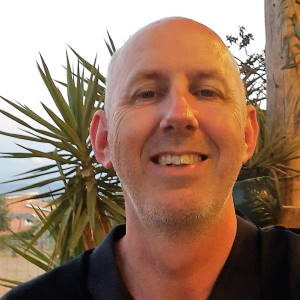
Jim Butcher is a lecturer and writer who has written a number of books on the sociology and politics of tourism. Dr Butcher blogs at Politics of Tourism, tweets at @jimbutcher2, and initiated Tourism’s Horizon: Travel for the Millions (a “GT” Partner) on Substack.
About the Tourism’s Horizon Interviews
“Good Tourism” Insight Partner Tourism’s Horizon: Travel for the Millions, in collaboration with “GT” and the Journal of Tourism Futures, has sought the candid views of well-known and respected experts on tourism’s past, present, and future.
The Tourism’s Horizon Interviews involves Jim Butcher, Vilhelmiina Vainikka, Peter Smith, Saverio Bertolucci, David Jarratt, and Sudipta Sarkar as interviewers. The “Good Tourism” Blog will publish their highlights and commentary as “GT” Insights.
We encourage you to read the full transcripts of each interview on Tourism’s Horizon’s substack. The Journal of Tourism Futures will publish the full set of transcripts later.
Featured image (top of post)
Professor Greg Richards took part in the Tourism’s Horizon Interviews and spoke about, among other things, academic silos, localism, overtourism, and modernity with Jim Butcher. He reckons: “We have lost faith in modernisation, owing to what Ritzer termed the ‘irrationality of rationality’.”



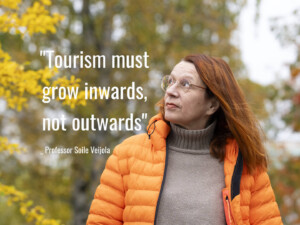
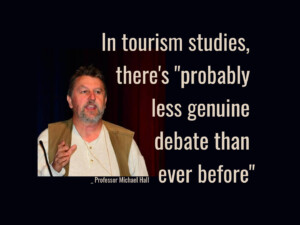
![Prof Greg Richards on academic silos, localism, overtourism, and modernity 7 Professor Richard Butler on tourism’s challenges and academia’s inadequacies ... "[Don't] let wishful thinking take precedence over logic"](https://www.goodtourismblog.com/wp-content/uploads/2023/12/Prof-Richard-Butler-on-tourisms-challenges-and-academias-inadequacies-300x225.jpg)
